Measures Against the COVID-19 Pandemic
Assistance from Japan Utilized in the COVID-19 Crisis
Turkey
Health and Medical Care in Remote Areas
Grant Assistance for Grass-Roots Human Security Projects
Project for Provision of Mobile Health Center in Altinordu (2018)
In Turkey, a mobile health screening vehicle equipped with health screening equipment was donated by Japan to carry out periodic health checks of residents living in mountainous areas, Syrian refugees, and others. Medical services using the vehicle and equipment began in March 2020, and they are contributing to not only regular mobile health screenings but also those related to COVID-19.
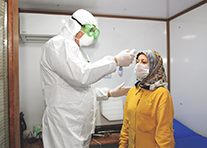
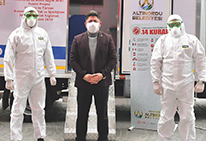
Myanmar
Healthcare and Medical Equipment
Supplementary Budget (2020) Grant Aid (Economic and Social Development Programme)
The first batch of medical equipment donated as part of the program (ten sets each of an ICU bed, syringe pump, and suction pump) arrived at Yangon International Airport in mid-August. This was handed over to Professor Zaw Than Htun, Director General of the Department of Medical Research, Ministry of Health and Sports, by Mr. MARUYAMA Ichiro, Ambassador Extraordinary and Plenipotentiary of Japan to the Republic of the Union of Myanmar. Since then, the equipment is being used in medical facilities across the country.
Bangladesh
Local Production of Medical PPE*
Technical Cooperation: Project for Capacity Building of Nursing Services (2016–2021)
In Bangladesh, personal protective equipment (PPE) including medical masks, gowns, and goggles, was in short supply. To protect frontline health care workers, the JICA Bangladesh office called for the cooperation of the country’s Ministry of Health and Family Welfare, and as a result, Snowtex Group, a Bangladeshi company, produced and supplied PPE conforming to WHO standards domestically, thanks to guidance from the Japanese goods inspection company K2. This is expected to contribute to securing jobs at local garment factories for workers who have faced difficulties due to the global economic downturn, while also helping to strengthen Bangladesh’s export industry.*
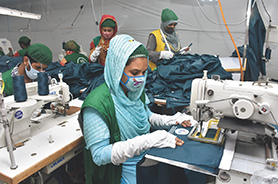
(Photo: JICA)
Cambodia
Healthcare and Medical Equipment
Supplementary Budget (2020) Grant Aid (Economic and Social Development Programme)
In Cambodia, where healthcare and medical systems are fragile, COVID-19 is expected to cause a huge number of human casualties once it spreads across the country. Therefore, Japan has been implementing procedures at an unprecedented speed to support the country, providing high purity oxygen generators—essential for medical facilities—in August. This equipment is being utilized effectively in hospitals and other facilities across Cambodia. Japan will continue to work closely with the Cambodian government to deliver life-saving equipment, including ambulances and ultrasound imaging devices.
Bhutan
BCP for Telecommunication Based on Lessons Learned from the 2011 Great East Japan Earthquake
—A Mission to Ensure Communications to Save Lives
Technical Cooperation: Project for Development of Business Continuity Plan (BCP) for Disaster Control in the Kingdom of Bhutan (2018–2021)
This project was started in order to formulate a business continuity plan (BCP) for disasters in Bhutan, an earthquake-prone country. The first positive case of COVID-19 in Bhutan was confirmed in March 2020, approximately three months after the BCP began operation in December 2019. Consequently, BCP staff at Bhutan Telecom, who had learned the importance of BCPs and ensuring the safety of employees during disasters through staff training in Japan, developed a BCP that was applicable to the COVID-19 pandemic, based on the one initially formulated during the project for large-scale disasters. The new plan is still being deployed as a measure against COVID-19 to this day.
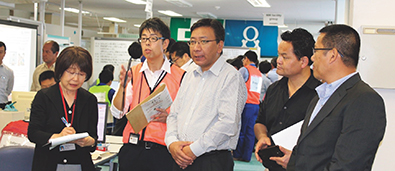
Urgent Measures with Consideration for Women and Children*
Technical Cooperation (Country-Focused Training): Gender Mainstreaming, Women’s Empowerment, and Child Well-Being and Child Rights (2019–2021)
Bhutan commenced its response against COVID-19, which took gender and children into consideration, only two weeks after the first positive case of COVID-19 in the country was confirmed in March 2020. The National Commission for Women and Children (NCWC), with Gender Focal Persons who received training in Japan at the forefront, has been raising awareness of the increased risk of domestic violence during the COVID-19 crisis and providing items to children’s daycare centers. A documentary about domestic violence was produced as part of the project with the support of Japan, and it was broadcast more than ten times over a five-day period on the state-run channel. In addition, educational posters and pamphlets on proper handwashing techniques, methods of preventing infection, basic knowledge of COVID-19, and similar topics were distributed at children’s daycare facilities run by NCWC to ensure that appropriate guidance on hygiene could be given to children and their parents.
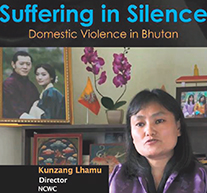
(Photo: JICA)
Laos
Healthcare and Medical Equipment
Supplementary Budget (2020) Grant Aid (Economic and Social Development Programme)
The medical system in Laos is extremely fragile, so if the infection spreads, there is a risk that it will spread rapidly not only within Laos, but also across the Mekong region. This programme therefore provided the country with healthcare and medical equipment, such as compact ambulances and hospital beds, to help prevent the spread of COVID-19 in the country and the international community through the strengthening of Laos’s healthcare and medical systems. At a handover ceremony held on August 23 during the visit to Laos, Foreign Minister MOTEGI himself handed over syringe pumps and defibrillators that arrived in the first batch of equipment to Foreign Minister Saleumxay of Laos. Foreign Minister Saleumxay then expressed his deep gratitude for Japan’s assistance. This equipment is being used effectively in hospitals and other medical facilities across Laos.
Rwanda
Local Production of Medical Face Shields
Technical Cooperation: ICT Innovation Ecosystem Strengthening Project (2017–2021)
Fablab is a creative space established by JICA in 2016 to assist ICT entrepreneurs in Rwanda. The space is fully equipped with 3D printers, computer numerical control machine tools, and laser cutters, among others. Following the
spread of COVID-19, Fablab was certified as the country’s only production base for medical face shields by the Rwandan government in 2020, and it has been distributing these to medical facilities across the country.
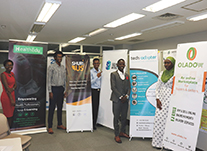
(Photo: JICA)
Ethiopia
Supplying Safe Water
Grant Assistance for Japanese NGO Projects (2017–2020)
HOPE International Development Agency Japan, a Japanese NGO that carries out international cooperation, has been working to improve water supply systems and provide hygiene education in Ethiopia since 2017. In the wake of the COVID-19 pandemic, HOPE provided instructions on handwashing while also distributing items such as masks, sanitizers, and soap. As part of this project, community residents have been participating in constructing simple water supply systems, which has enabled them to manage and repair the facilities by themselves after installation has been completed. Moreover, communities are encouraged to invite women onto their water committees after the facilities are put in place, which helps to empower women and increase their social engagement.
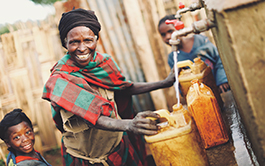
(Photo: KONDO Simon, HOPE International Development Agency Japan)
Marshall
Healthcare and Medical Equipment
Supplementary Budget (2020) Grant Aid (Economic and Social Development Programme)
Marshall is an island country comprising 29 atolls and numerous islands. While measures such as suspending entry into the country have been successful in containing the spread of COVID-19 within the country, Japan has decided to offer assistance in preparation for the future, aiming to provide facilities and medical equipment for quarantine, diagnoses, and isolation, as well as improve the overall level of medical care over the medium to long-term. Thanks to assistance from Japan, the main hospitals in the country are scheduled to be equipped with radiography systems, CT scanners, bedside monitors, and other equipment. Among these, stethoscopes and blood pressure manometers have already reached Marshall, and these have been distributed to 52 clinics on remote islands to help improve basic medical care.
Brazil
5S as a Measure Against COVID-19, Implementation of KAIZEN*
Training Program for Nikkei Communities (2016)
In Brazil, where infection is widespread, former JICA trainees of the Training Program for Japanese Descendants are playing an active part in responding to the COVID-19 pandemic. Santa Cruz Hospital was a Japanese hospital built in São Paulo in 1939, and has long been well-regarded as a medical facility for Japanese immigrants and local residents. In 2016, nurses working at the hospital participated in the Training Program for Japanese Descendants courses “Improvement of Nurses’ Management Skills by 5S–Kaizen” and “Kaizen and 5S,” acquiring knowledge of 5S from the perspective of preventing infection and 5S–Kaizen (improvement) for medical equipment (5S: five Ss comprising seiri (sort), seiton (set), seiso (shine), seiketsu (standardize), and shitsuke (sustain)). With the former JICA training participants at the forefront, the hospital is currently employing the knowledge of 5S and Kaizen in developing guidelines for internal and external related parties, drawing up a zoning plan to separate ICU nurses and those in charge of general wards, and implementing initiatives to separate the lines of movement of patients suspected of having COVID-19 and other patients to prevent contact between them.
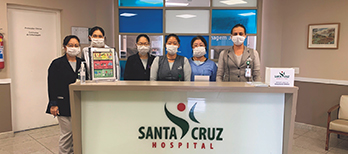
* Details on episodes are also available on JICA’s special website regarding COVID-19
(https://www.jica.go.jp/COVID-19/ja/index.html#TeamJICAinaction).
